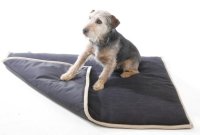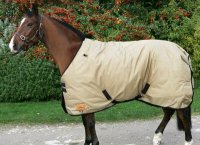|
"Rugs
without Bugs": Press
release University of Lincoln
 ______________________
______________________ 
Press release
22nd November 2004
RUGS WITHOUT BUGS
Students and staff at the University of Lincoln have
helped develop a new type of pet bedding and horse rug, which kills
unwanted bugs.
Veterinary microbiology research at the university's Riseholme Park
campus, which is led by senior lecturer Frank Ruedisueli, is focused
on investigating novel anti-microbial compounds.
During the tests carried out by staff and students, anti-fungal
and anti-bacterial fibres that were incorporated into textiles were
tested against pathogenic skin microbes, including ringworm, Malassezia
and Staphylococcus.
The research was sponsored by manufacturers Equimed UK, who have
used it to produce a series of new products for animals.
Following successful inhibition of these organisms, fibres were
then incorporated into pet bedding, horse rugs and travel bandages
to prevent contamination of such materials by the pathogens.
The result was a product range that aims to help prevent skin infections
caused by these pathogens, including the super bug MRSA. A recent
article in the Mail on Sunday warned that the bug, which kills around
5,000 NHS patients every year, could become widespread in veterinary
clinics.
"I am always thrilled to see research results make it to practical
applications, even more so when it allows students to participate
in applied research, something which we consider to be a vital element
in our courses," said Mr Ruedisueli.
Equimed spokesman Roland Cox added: "We are keen to see these
products make a difference and look forward to more research collaboration
with the University of Lincoln."

|


